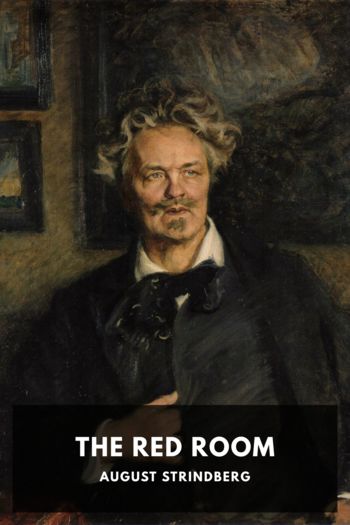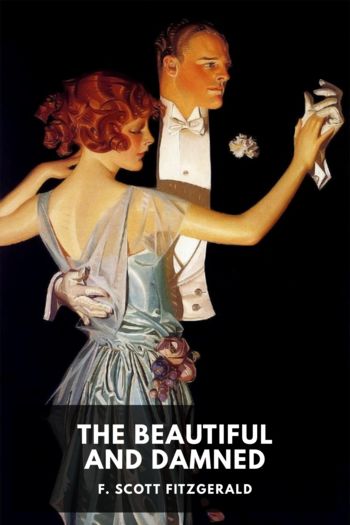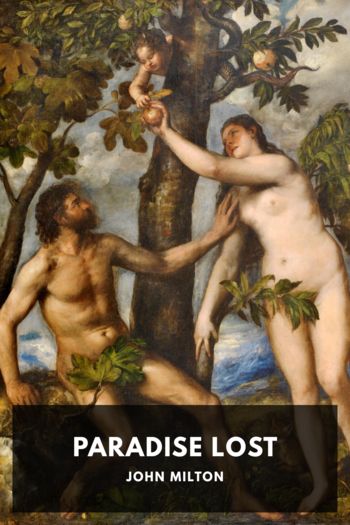The Inferno by August Strindberg (love novels in english .txt) 📕

- Author: August Strindberg
Book online «The Inferno by August Strindberg (love novels in english .txt) 📕». Author August Strindberg
I do not believe in demons, and yet I wish to see the impression which my little figures make on the sparrows who generally take their crumbs from my windowsill. So I place them there. The sparrows are frightened and remain aloof. There is then some likeness in the figures which they can distinguish, and some reality in this conjunction of dead material and fire.
The sun, as it warms my little figures, makes the demon with the cock’s head collapse. This reminds me of the country-people’s saying that if the dwarfs wait too long till sunrise, they die.
Things happen in the hotel which disquiet me. The morning after my arrival I find on the board where the keys of the rooms are hung up, on the ground-floor, a letter addressed to a Mr. X., a student, who has the same name as my wife. The postmark is “Dornach,” the name of the Austrian village where my wife and child live. But since I am certain that there is no post-office at Dornach, the matter remains mysterious. This letter, placed in such a conspicuous position as to challenge the eye, is followed by others. The second bears the postmark “Vienna,” and is addressed to a Dr. Bitter; the third displays the Polish pseudonym, “Schmulachowsky.”
The Devil certainly has a share in this game, for this name is a false one, and I understand well for whom the letter is intended—for a deadly enemy of mine who lives in Berlin. At last there arrives a letter with the postmark “Vienna,” which, according to the printed envelope, comes from the chemical bureau of Dr. Eder. So they are trying to spy out my gold-making experiments! Without doubt a plot is on foot here, but the Devil has mixed these sharpers’ cards. These duffers do not consider that I keep my eyes open towards all quarters of the compass.
I have made inquiries of the waiter regarding Mr. X., but he gives me in all simplicity to understand that he is an Alsatian—nothing more. One fine morning I return from my work and see in the letter-rack quite close to my keys a post card. For a moment I feel tempted to solve the riddle by looking at the post card, but my good angel paralysed my hand, just as the young man came out of his hiding-place behind the door. I look him in the face and am startled; he is exactly like my wife. We greet each other silently, and each goes his way.
I have never been able to unravel this conspiracy, since I did not know the actors in this drama. Moreover, my wife has neither brothers nor cousins. This undefined threatening spectre of a continuous vengeance tortured me for half a year. I bore it like everything else as a punishment for known and unknown sins.
At the New Year a stranger turned up in our restaurant. He was an American artist, and came exactly at the right time to put new life into our depressed society. But though he was an active and bold spirit with cosmopolitan ideas and good company too, he inspired me with an undefined mistrust. In spite of his confident air his demeanour revealed to me his real position. The crash came quicker than one expected.
One evening the unfortunate man came into my room and asked for permission to remain there a short time. He looked like a lost man, and such in fact he was. His landlord had driven him out of his studio, his grisette had left him, he was head over ears in debt, and his creditors were dunning him; he was insulted in the streets by the supporters of his unpaid models. But what depressed him most of all was that the cruel landlord had retained his picture intended for the Champ de Mars Exhibition. The originality of its subject had given him good grounds to hope for its success. It displayed an “emancipated woman” crucified and cursed by the mob.
Since he was also heavily in debt to the restaurant, he had to go about the streets, hungry. Among other things he confessed that he had taken morphia enough to kill two people, but death apparently did not yet want him. After an earnest discussion, we agreed to go to another quarter, and there eat our meals in some obscure cook-shop. I said I would not desert him, and that he should pluck up new courage and begin a new picture for the exhibition of independent artists.
This man becomes now my sole companion, and his misfortunes cause me a double share of suffering, so closely do I identify myself with him. I do so in a spirit of defiance, but presently gain an interesting experience thereby.
He reveals to me his whole past. He is a German by birth, but partly because of family disagreements, partly because of a lampoon for which he had been brought into court, he has spent seven years in America. I discover in him intelligence above the average, a melancholy temperament, and unbridled sensuality. But behind this mask of a cosmopolitan I begin to divine another character which disquiets me, and the full discovery of which I postpone to a favourable opportunity.
Thus pass two months, while I live in union with this stranger and with him go through all the troubles of an unfortunate artist over again, without remembering that I am a made man, yes, and rank among the dramatic celebrities of Paris, though, as a chemical discoverer, I think





Comments (0)